#pro atla
Explore tagged Tumblr posts
Text

03×05 THE BEACH: A lion turtle
#LION TURTLE#!!!#aang#avatar aang#avatar: the last airbender#avatar the last airbender#avatar#a:tla aang#atla aang#a:tla#atla#atla gifs#a:tla gifs#aang gifs#pro aang#pro atla#katara#sokka#zuko#toph beifong#toph#azula#mai#ty lee#uncle iroh#iroh
50 notes
·
View notes
Text
I feel like people miss the point of the "war is bad" message
What it's supposed to mean is that war is terrible, it's destructive, it ruins lives, it leaves scars, and you should only partake in it when there are no other options, because even if you win, even if you survive, you will not be the same, which is why the phrase used to be more commonly known as "war is hell"
But "war is bad" seems to have been construed by people in fandom into "any fighting is bad, if you fight you're morally terrible and impure, you should not fight at all, no matter what", this is annoying in fandom, as it often misses the point fiction is trying to make, but what's worrisome is when people apply this to real life, as I have seen people do regarding russia's invasion of Ukraine
And that's almost never the point of "War is Bad" works
Works like Lord of the Rings, Avatar The Last Airbender, Transformers, The Clone Wars, Halo (especially Reach), etc all have themes on how horrible war is, but they categorically do not say it is wrong to fight, what they say is usually along the lines of "war is terrible, and what makes it so terrible is that we have no choice but to fight, it would be ideal if we didn't have to fight at all, but we must fight, because not fighting is not an option, because not fighting, not opposing tyranny, conquest, and evil only allows those things to exist unimpeded"
#wooloo-writes#wooloo writes#war#war is hell#war is bad#lord of the rings#sw#star wars#lotr#avatar the last airbender#atla#transformers#tf#tcw#star wars the clone wars#sw tcw#halo#halo reach#pro jedi#in defense of the jedi
6K notes
·
View notes
Text
im sorry but i actually love kataang’s height difference in the show and i think it’s one of the cutest things ever
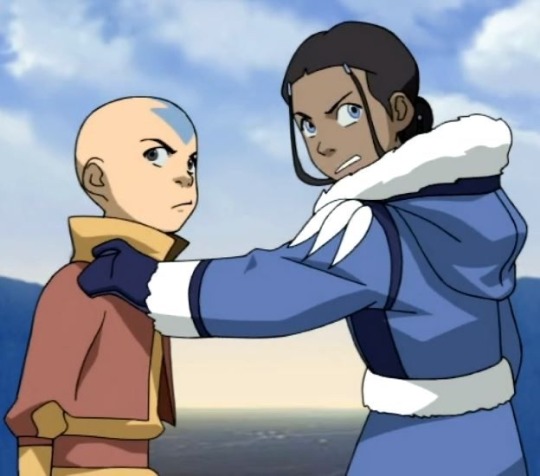
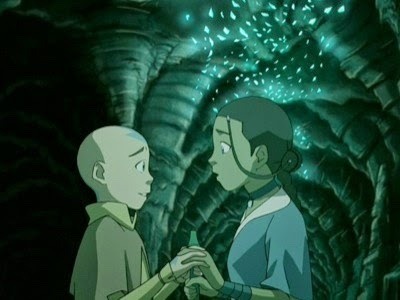
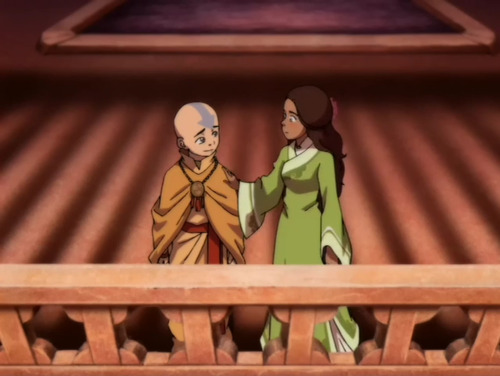

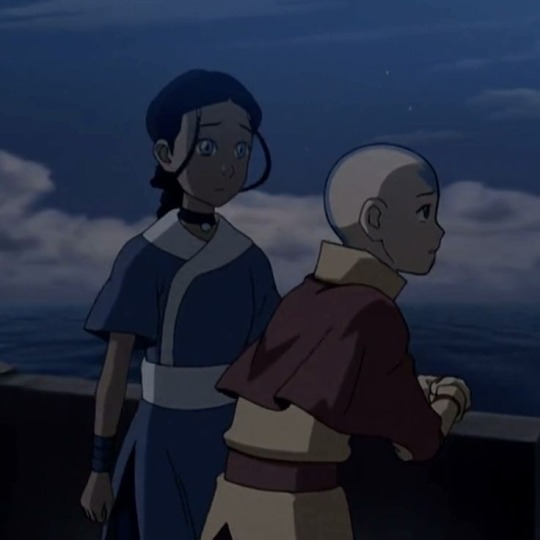
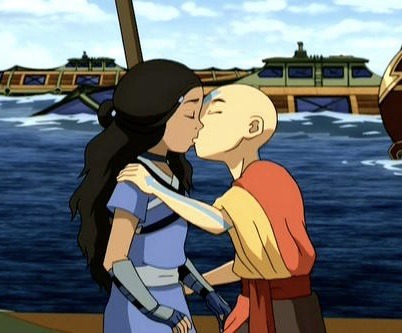
like idg when anti shippers are like “whY wOuLd KatARA like AANG he’s SHORTER than HeR!!1!1!” Like ok…??? And ???? it’s fucking adorable. yeah I know eventually he gets taller than her in the comics when they get older but idc, let me have my short king Aang <333 the fact he’s shorter than her when they get together is so real to me and no one can take cartoon!kataang height diff from me
3K notes
·
View notes
Text

𝒴𝑜𝓊 𝓇𝒾𝓈𝑒 𝓌𝒾𝓉𝒽 𝓉𝒽𝑒 𝓂𝑜𝑜𝓃, 𝐼 𝓇𝒾𝓈𝑒 𝓌𝒾𝓉𝒽 𝓉𝒽𝑒 𝓈𝓊𝓃
#zutara#katara#zuko#avatar the last airbender#atla#pro zutara#atla fan art#my roman empire#i love them your honor
789 notes
·
View notes
Text

🧡💛♥️⬇️
#avatar the last airbender#aang#avatar aang#atla#avatar netflix#atla fanart#aang fanart#pro aang#(thats a tag? i thought everybody on my boy’s side!)#avatar#digital art#illustration#artists on tumblr#drawing#art#netflix#myart
4K notes
·
View notes
Text
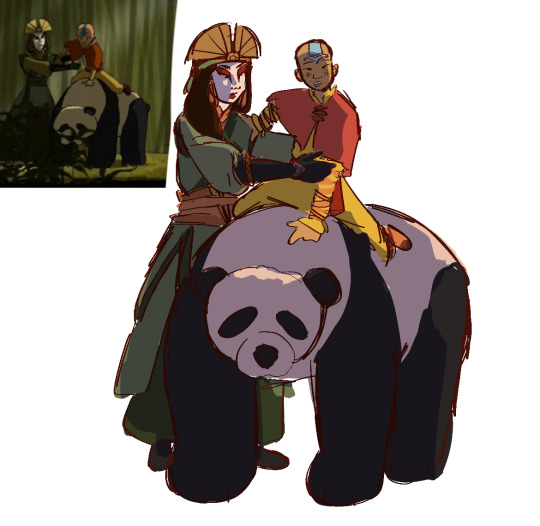
sick of kyoshi mischaracterization i think
#sighhh if i see one more person make her a bloodlusted angry impulsive person im going to lose it#aang#kyoshi#avatar aang#avatar kyoshi#avatar the last airbender#avatar: the last airbender#atla#atla aang#atla kyoshi#my art#guys this is not a place to call aang immature this is a pro aang area gtfo#yes this is targeted towards that one person in the replies
2K notes
·
View notes
Text

Look at love for Kataang
I try this to do something new in my art !
#kataang#aang x katara#kataang defense#avatar the last airbender#pro kataang#katara#aang#atla#avatar: the last airbender#atla fanart#kataangtag#katara x aang#look at love for Kataang#I love them sm#theyre so cute
752 notes
·
View notes
Text
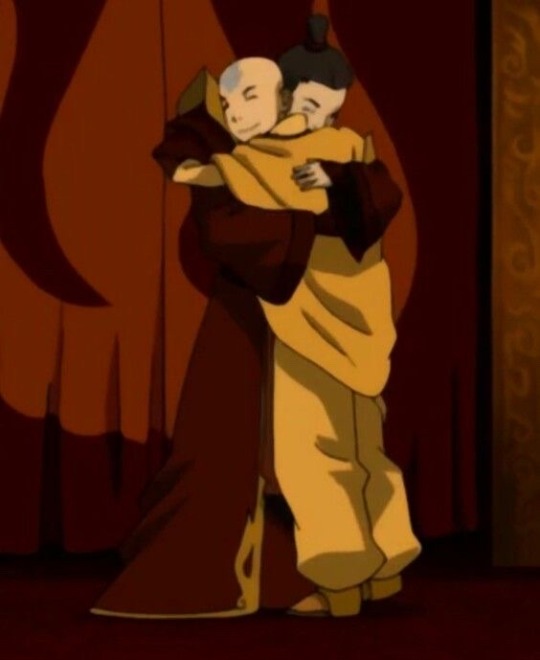
i find it really funny how a large (enough) majority of zuko stans seem to hate/be anti aang as if zuko HIMSELF doesn’t become the no.1 aang fan at some point
#like#they’re besties#aang#zuko#pro aang#i love them so. so so mych#brothers EVER#atla#avatar#avatar: the last air bender#avatar aang#firelord zuko#zuko and aang
2K notes
·
View notes
Text
People will go on about how "Katara's story is a tragedy" because she... ended up marrying the guy she loves, having children and grandchildren which she was always excited about and literally becoming a master waterbender and rising to the top of her field as a healer.
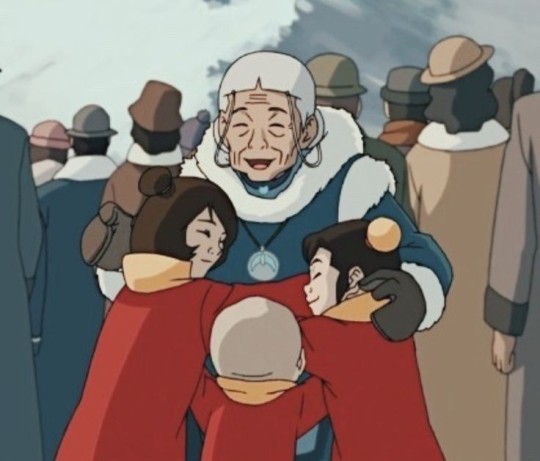
Yes, Katara's story has tragic aspects to it. And there are certainly flaws in how she is written in tlok (Though I will argue that there are actually more issues with how Toph and Zuko are just plopped in there for no reason in later seasons). And her storylines aren't perfect, for example her resolving her trauma around the murder of her mother being more used to prop up Zuko than her own internal turmoil. (Most of TSR is from Zuko's perspective and I hate that actually)
"Katara's story is a tragedy" Why do you have such a hard on for this woman's misery? Let her be happy, man.
You know what gaang girlie's life is an actual onscreen tragedy?
Toph's!

People will fucking downplay Toph's childhood abuse because she wasn't physically hurt, but her childhood was a never ending carousel of abelism, misogyny, neglect and isolation. The way Toph describes her parent's treatment of her as "pressure and pain" is heartbreaking.

Toph's only escape was Earth Rumble and earthbending, but despite her skills, she remained the perfect little lady her parents always wanted her to be. She's never known a different life, and she was only able to be her real self in secret.
And when Toph finally opens up to her parents, when she finally lays her real self bare in front of the people who are supposed to love and care for her?
She is met with what may be, in my opinion, the cruellest rejection in the show.
Despite this, even when Toph runs away, she still cares for her parents' approval. Hell, she's even lured into a trap due to her getting a forged letter from her mom and getting excited because it looked like her mom was finally accepting her.
It's also important to note how determined to be self sufficient and to prove herself Toph is. We can especially see this right after she joins the Gaang, where she refuses to participate in splitting with the rest of the group, insisting on "pulling her own weight". This isn't Toph being a brat, or spoilt, this is her wanting to prove that she can handle herself because people have handled and understimated her her entire life.
Eventually, Toph starts to learn to trust the members of the Gaang and this is a step in the right direction. She's literally making friends for the first time in her life I'm so proud of her.
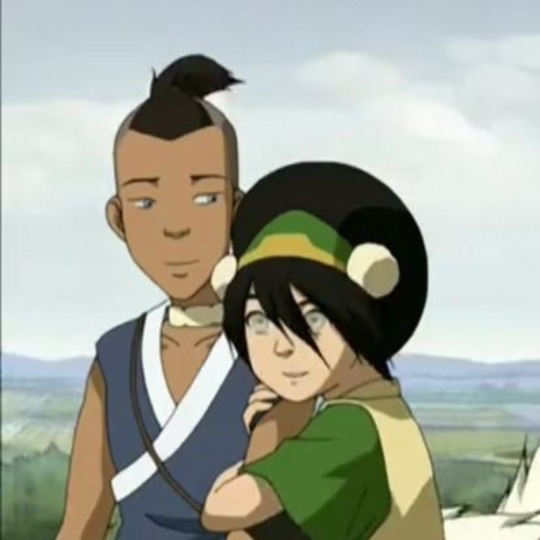
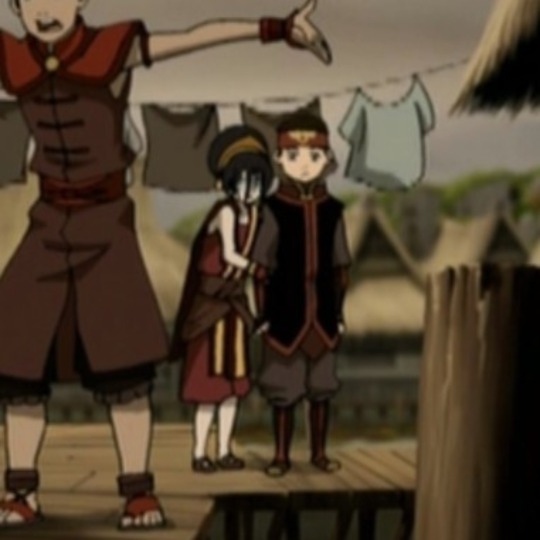
However, I was genuinely upset when Toph's life changing field trip with Zuko didn't work out. When Toph was trying to connect with Zuko and he blew her off (I'm not blaming him tho they had shit to do), I couldn't help but remember the rejection Toph suffered from Lao.

Post canon, Toph continues to try and prove herself, starting a metalbending school and training new metalbenders.
She also reconciles with her father. Not before Lao disowns he rmultiple times and calls her a rude, ungrateful thing. And while he eventually comes to understand Toph and cherish her, that type of trauma sticks with you.
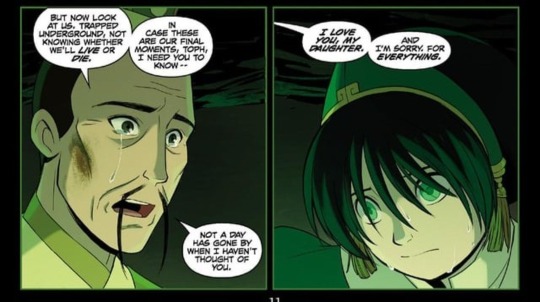
So it's no wonder really that Toph, someone who went her entire childhood seemingly without even speaking to someone her age, would have trouble forming connections. She has children with two different men, neither of which seem to stick around.
Toph tries to do right by her daughters and gives them the freedom she never got. Sadly, the pendulum swung too far to the other side, since it seems that she started to neglect her daughters, which led to them developing a sleugh of issues of their own.
Toph becomes the cheif of police, which kind of makes sense. Republic City was only slowly emerging as an actual metropolis. Toph took on a role as a protector, and probably as a way to prove herself. But as Republic City grew, Toph probably realised that she became something she hated. A cog in the machine, and started to despise her job.
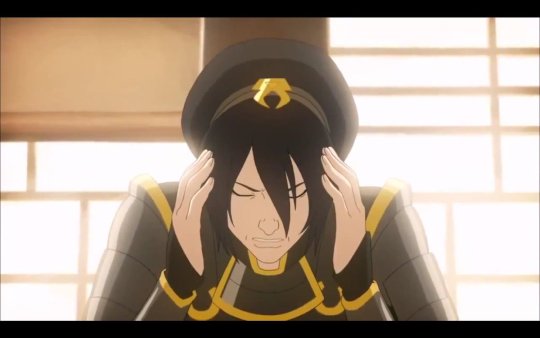
Searching for a semblance of the freedom and happiness her travels afforded her in her childhood, Toph leaves the city and takes up the life of a hermit in a swamp. She managed to fix her relationship with Suyin to some extent, but still seems reluctant or simply unable to connect with her daughter or grandchildren. Since she apparently hasn't seen Opal, a grown 20 year old woman since she was a little girl.
On the surface old Toph doesn't seem terribly dissimilar to young Toph, still tough and spunky. But she is more jaded, depressed and pessimistic. She comes out to save Suyin from immediate harm and manages to somewhat reconcile with Lin, but then she fucks right back off to the swamp where she seems to literally hide until Wu and Korra straight up force her to come with them.
Toph's story began with her alone and it seems to end with her alone as well. It's a story of a girl who grew up isolated and handled by others, and was woefully unprepared for the real world, which only jaded her further. She lives with the guilt of fucking up her daughters' lives and a belief in the pointlessness of life.
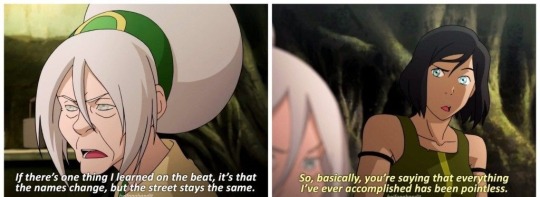
Toph started off longing to experience the world and ended up willingly isolating herself from it.
If that isn't a tragedy, I'm not sure what is.

Mind you, this is not the trauma olympics. I'm not saying that Toph has suffered more than Katara or that Katara's trauma is not as valid as Toph's. Katara and Toph's experiences are completely different, Katara being a victim of genocide and war, Toph being a victim of child abuse. I'm just saying that, objectively, Katara had a happier 'ending' than Toph.
#that being said I lowkey love Toph's storyline#i don't think her life would be better if she were in a “traditional” family btw#hey lao beifong what if i killed you#toph beifong#toph#katara#suyin beifong#lin beifong#zuko#aang#lao beifong#beifong brainrot#opal beifong#legend of korra#avatar#tlok#the legend of korra#avatar the legend of korra#atlok#lok#atla#avatar: the last airbender#the last airbender#avatar the last airbender#kataang#pro toph beifong
1K notes
·
View notes
Text
I'm tired of people defining Aang as this boring little vanilla guy. Aang helped Katara destroy a factory. He participated in Toph's scams. He shrugged off Katara's theft of the waterbending scroll and heartily laughed at her jokes about it. He was delighted by the Painted Lady ruse. He mastered airbending at twelve and the avatar state at thirteen. He snooped around the old ship after Katara said it was booby trapped and dared her to follow and stepped up to take the blame when it went badly and then surrendered himself to protect the village because he knew he could hand everyone on that ship their asses and escape. He outright lied to two communities that had been bickering for a century to get them to stop. He egged on Katara when she decided to throw hands with Pakku. He wants to ride every big animal in the world ("they don't like being ridden but that's what makes it fun" -unhinged take). He has sick burns for everyone which are doubly funny because they're almost always unintended as such. He threw a clandestine dance party in the nation that banned dancing and thought he was dead and wanted him dead. Before that he corrected and argued with teachers, beat a bully without lifting a finger and then brought his teenage friends to pose as his parents. The whole Bonzu Pippipadaleopsicopolis the Third thing. The being idiots with Sokka in Ba Sing Se thing with the bowing and the busboys disguises. He rightfully asked "what's cosmic power compared to a girl". Let's add all the badass stuff he does as a bender and as the Avatar up to and including energybending and the conversation with Koh the Face Stealer. That time in The Chase when he finished the fur trail and then decided to just sit down, sleep deprived, to wait and face whoever it was chasing them. Aang is one of the funniest and coolest characters I've ever seen and he deserves more respect. Absolutely unhinged kid with immense powers and the world is lucky he's goofy and has a good heart.
8K notes
·
View notes
Text
The fact that everytime when Katara is healing or doing a check up she applies the water directly on the wound, but with Zuko she had to, SHE REALLY HAD TO put her bare hands on his scar

Like yeah...she is obviously just trying to check his scar. There is no other intention behind her actions here, but this is also a writing choice deliberately made to add more tension between them

424 notes
·
View notes
Text
Katara's Story Is A Tragedy and It's Not An Accident
I was a teenaged girl when Avatar: The Last Airbender aired on Nickelodeon—the group that the show’s creators unintentionally hit while they were aiming for the younger, maler demographic. Nevermind that we’re the reason the show’s popularity caught fire and has endured for two decades; we weren’t the audience Mike and Bryan wanted. And by golly, were they going to make sure we knew it. They’ve been making sure we know it with every snide comment and addendum they’ve made to the story for the last twenty years.
For many of us girls who were raised in the nineties and aughts, Katara was a breath of fresh air—a rare opportunity in a media market saturated with boys having grand adventures to see a young woman having her own adventure and expressing the same fears and frustrations we were often made to feel.
We were told that we could be anything we wanted to be. That we were strong and smart and brimming with potential. That we were just as capable as the boys. That we were our brothers’ equals. But we were also told to wash dishes and fold laundry and tidy around the house while our brothers played outside. We were ignored when our male classmates picked teams for kickball and told to go play with the girls on the swings—the same girls we were taught to deride if we wanted to be taken seriously. We were lectured for the same immaturity that was expected of boys our age and older, and we were told to do better while also being told, “Boys will be boys.” Despite all the platitudes about equality and power, we saw our mothers straining under the weight of carrying both full-time careers and unequally divided family responsibilities. We sensed that we were being groomed for the same future.
And we saw ourselves in Katara.
Katara begins as a parentified teenaged girl: forced to take on responsibility for the daily care of people around her—including male figures who are capable of looking after themselves but are allowed to be immature enough to foist such labor onto her. She does thankless work for people who take her contributions for granted. She’s belittled by people who love her, but don’t understand her. She’s isolated from the world and denied opportunities to improve her talents. She's told what emotions she's allowed to feel and when to feel them. In essence, she was living our real-world fear: being trapped in someone else’s narrow, stultifying definition of femininity and motherhood.
Then we watched Katara go through an incredible journey of self-determination and empowerment. Katara goes from being a powerless, fearful victim to being a protector, healer, advocate, and liberator to others who can’t do those things for themselves (a much truer and more fulfilling definition of nurturing and motherhood). It’s necessary in Katara’s growth cycle that she does this for others first because that is the realm she knows. She is given increasingly significant opportunities to speak up and fight on behalf of others, and that allows her to build those advocacy muscles gradually. But she still holds back her own emotional pain because everyone that she attempts to express such things to proves they either don't want to deal with it or they only want to manipulate her feelings for their own purposes.
Katara continues to do much of the work we think of as traditionally maternal on behalf of her friends and family over the course of the story, but we do see that scale gradually shift. Sokka takes on more responsibility for managing the group’s supplies, and everyone helps around camp, but Katara continues to be the manager of everyone else’s emotions while simultaneously punching down her own. The scales finally seem to tip when Zuko joins the group. With Zuko, we see someone working alongside Katara doing the same tasks she is doing around camp for the first time. Zuko is also the only person who never expects anything of her and whose emotions she never has to manage because he’s actually more emotionally stable and mature than she is by that point. And then, Katara’s arc culminates in her finally getting the chance to fully seize her power, rewrite the story of the traumatic event that cast her into the role of parentified child, be her own protector, and freely express everything she’s kept locked away for the sake of letting everyone else feel comfortable around her. Then she fights alongside an equal partner she knows she can trust and depend on through the story's climax. And for the first time since her mother’s death, the girl who gives and gives and gives while getting nothing back watches someone sacrifice everything for her. But this time, she’s able to change the ending because her power is fully realized. The cycle was officially broken.
Katara’s character arc was catharsis at every step. If Katara could break the mold and recreate the ideas of womanhood and motherhood in her own image, so could we. We could be powerful. We could care for ourselves AND others when they need us—instead of caring for everyone all the time at our own expense. We could have balanced partnerships with give and take going both ways (“Tui and La, push and pull”), rather than the, “I give, they take,” model we were conditioned to expect. We could fight for and determine our own destiny—after all, wasn’t destiny a core theme of the story?
Yes. Destiny was the theme. But the lesson was that Katara didn’t get to determine hers.
After Katara achieves her victory and completes her arc, the narrative steps in and smacks her back down to where she started. For reasons that are never explained or justified, Katara rewards the hero by giving into his romantic advances even though he has invalidated her emotions, violated her boundaries, lashed out at her for slights against him she never committed, idealized a false idol of her then browbeat her when she deviated from his narrative, and forced her to carry his emotions and put herself in danger when he willingly fails to control himself—even though he never apologizes, never learns his lesson, and never shows any inclination to do better.
And do better he does not.
The more we dared to voice our own opinions on a character that was clearly meant to represent us, the more Mike and Bryan punished Katara for it.
Throughout the comics, Katara makes herself smaller and smaller and forfeits all rights to personal actualization and satisfaction in her relationship. She punches her feelings down when her partner neglects her and cries alone as he shows more affection and concern for literally every other girl’s feelings than hers. She becomes cowed by his outbursts and threats of violence. Instead of rising with the moon or resting in the warmth of the sun, she learns to stay in his shadow. She gives up her silly childish dreams of rebuilding her own dying culture’s traditions and advocating for other oppressed groups so that she can fulfill his wishes to rebuild his culture instead—by being his babymaker. Katara gave up everything she cared about and everything she fought to become for the whims of a man-child who never saw her as a person, only a possession.
Then, in her old age, we get to watch the fallout of his neglect—both toward her and her children who did not meet his expectations. By that point, the girl who would never turn her back on anyone who needed her was too far gone to even advocate for her own children in her own home. And even after he’s gone, Katara never dares to define herself again. She remains, for the next twenty-plus years of her life, nothing more than her husband's grieving widow. She was never recognized for her accomplishments, the battles she won, or the people she liberated. Even her own children and grandchildren have all but forgotten her. She ends her story exactly where it began: trapped in someone else’s narrow, stultifying definition of femininity and motherhood.
The story’s theme was destiny, remember? But this story’s target audience was little boys. Zuko gets to determine his own destiny as long as he works hard and earns it. Aang gets his destiny no matter what he does or doesn’t do to earn it. And Katara cannot change the destiny she was assigned by gender at birth, no matter how hard she fights for it or how many times over she earns it.
Katara is Winston Smith, and the year is 1984. It doesn’t matter how hard you fight or what you accomplish, little girl. Big Brother is too big, too strong, and too powerful. You will never escape. You will never be free. Your victories are meaningless. So stay in your place, do what you’re told, and cry quietly so your tears don’t bother people who matter.
I will never get over it. Because I am Katara. And so are my friends, sisters, daughters, and nieces. But I am not content to live in Bryke's world.
I will never turn my back on people who need me. Including me.
#ATLA#Avatar the Last Airbender#Katara#Anti Bryke#Zutara#but not really#just pro-Katara#Anti Kataang
3K notes
·
View notes
Text

👆👆
1K notes
·
View notes
Text
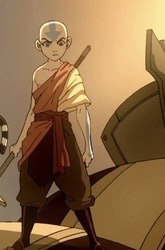


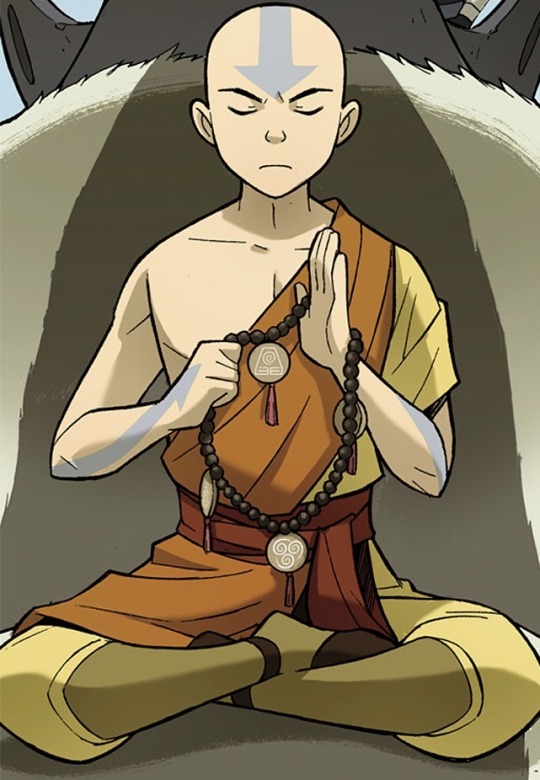
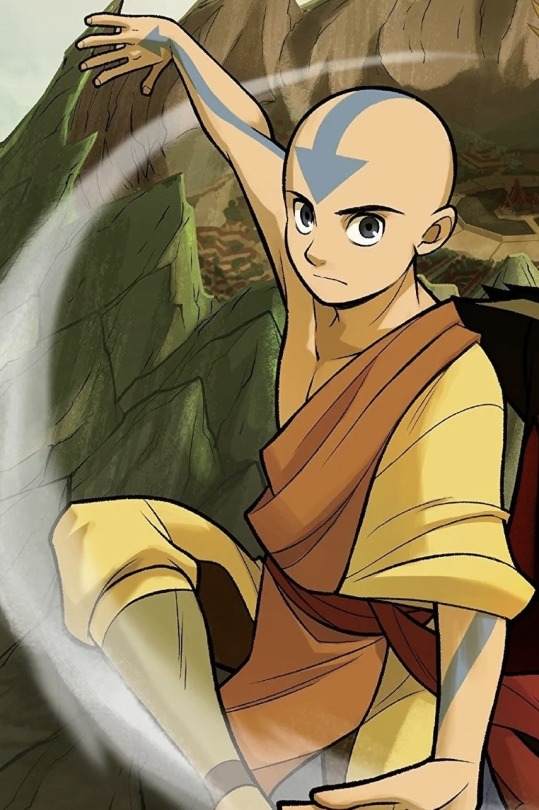
I know when Aang started running around in this off the shoulder look that Katara was screaming crying throwing up having a whole ass crisis
2K notes
·
View notes
Text

This is what peak masculinity looks like.
#zutara#zuko#katara#atla#atla fan art#avatar the last airbender#katara/zuko#zuko/katara#prince zuko#pro zutara
701 notes
·
View notes
Text
Zutara, romance novels, and the female gaze
Okay so I’ve been thinking about the female gaze a LOT so I checked out a subreddit about romance novels, despite never having read one. I came across this meme (which was initially a Tumblr post and then got posted to Instagram and then to Reddit and I’m now bringing back to Tumblr — Internet telephone, pls never change):
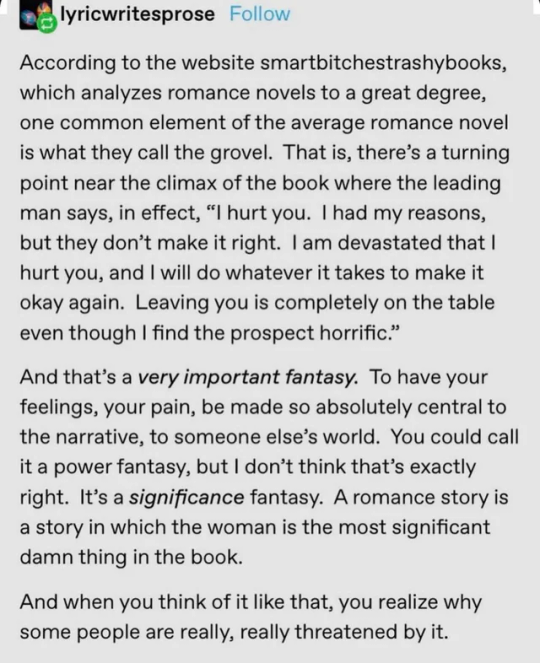
And…what is The Southern Raiders, if not a platonic grovel? Katara’s pain is central to the episode. It’s central to Zuko. Zuko asks Katara what he can do to make up for his betrayal; she demands the impossible. He reads between the lines, cockblocks her brother to get the necessary information, and then waits outside her door overnight (which he also did for Iroh, the one person we know for sure he loves). He basically makes himself a receptacle for her rage, and he holds space for her by coming with her on her revenge quest and carrying their bags and not saying a damn thing about what she should and should not do beyond like…asking her to rest. And obviously the grovel works! She forgives him and then they’re thick as thieves, bantering and fighting and saving each other’s lives, etc.
On a different note, I’ve been told that enemies to lovers is one of the biggest tropes in romance novels, similar to YA lit and fanfic. Here’s something else I found in the romance novel discourse:
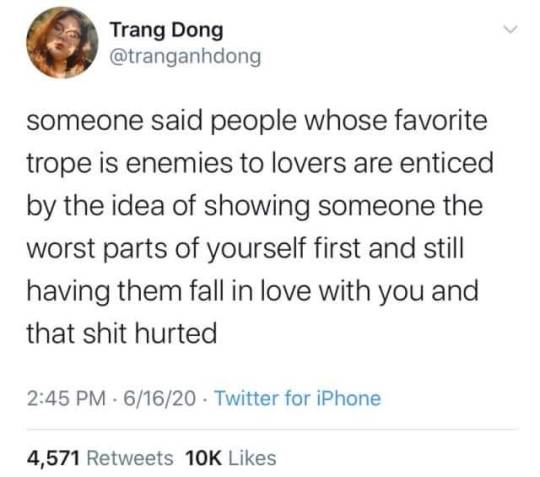
And…yeah. In TSR, Katara really does show Zuko her worst self, because she doesn’t feel the need to perform for him. She doesn’t feel the need to perform moral perfection OR cold blooded vengeance. She bloodbends in front of him and he just goes with it. She doesn’t kill Yon Rha and he just goes with it. He doesn’t treat her any differently afterwards. Maybe they talk about it off screen, but I kind of like the idea that they don’t, because Katara doesn’t need to explain anything. And it’s so interesting, because some people in the ATLA fandom have a totally different read on TSR. They think Zuko was encouraging Katara to get revenge (by what, keeping his mouth shut?), and that Aang is the one who acts as her moral compass. I believe that either Bryan or Mike said in the DVD commentary that Aang is the angel on her shoulder the entire time. And this interpretation does make sense if you see it from the male gaze, where Katara as an object of affection is acting in an angry, irrational, threatening way. But if you see it from the female gaze, you recognize that actually it’s probably the most emotionally taxing experience Katara has to go through, and she doesn’t owe it to be nice or perfect to anybody. Katara’s formative trauma literally comes to a head, and she has to make a decision — no, a discovery — about who she is in relation to the tragedy that defines her life and even her identity (as a waterbender, as a parentified child who becomes the mom friend, as a genocide victim), and she’s accompanied by someone who trusts her judgement and validates her feelings.
I’m not saying TSR is explicitly romantically coded, but when it conforms so well to romance novel tropes…is it any wonder that so many people thought “yes this is her man?” And then he takes lightning in the heart for her and reaches for her when he’s literally dying, I will never be normal about that either
#Zutara#Katara#Zuko#the southern raiders#Pro zutara#anti Bryke#I guess#I swear I’m not a Bryke anti but I feel like they just don’t get#The female gaze#and the fact that Zutara is so female gaze is kind of an accident and I find that fascinating#atla fandom critical#The southern raiders turned me into a Zutara shipper#one ep away from the finale#Zutara meta#My meta
2K notes
·
View notes